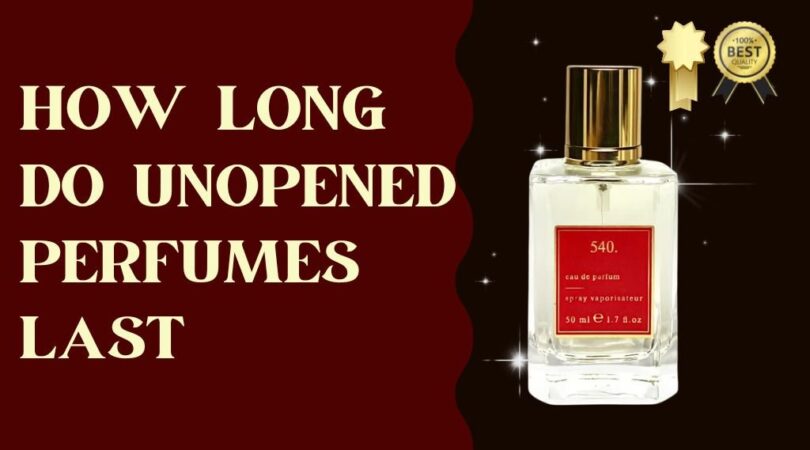Perfumes generally stay good for around three to five years, depending on the storage conditions. Perfume is a luxurious and often pricey indulgence for many people.
Whether it’s a signature scent or a special occasion fragrance, no one wants to waste their investment by using a perfume that has gone bad. But how long do perfumes actually stay good? Understanding the expiration date of perfumes can help you make the most out of your fragrances and ensure they are at their best when you wear them.
We will explore the factors that affect the shelf life of perfumes, how to store them properly, and some signs that indicate when it’s time to bid farewell to your beloved fragrance. By the end, you’ll have a clear idea of how to make your perfumes last as long as possible. So, let’s dive in!
Factors Affecting Perfume Longevity
Factors affecting perfume longevity include storage conditions, fragrance composition, and expiry dates. Storage conditions play a crucial role in maintaining the quality of perfumes. Exposure to heat, light, and air can degrade the fragrance over time. Properly storing perfumes in cool, dark places can help extend their lifespan.
Fragrance composition is another key factor. Some perfume ingredients may evaporate faster than others, affecting the overall longevity. Finally, checking the expiry dates is essential. While perfumes don’t necessarily go bad, they can lose their quality and potency over time.
It’s recommended to use perfumes within three to five years from the manufacturing date. By considering these factors, you can ensure that your perfumes stay good for a longer duration, providing you with a delightful scent experience.
Optimal Temperature And Humidity Levels
Perfumes stay good for a certain period, and maintaining optimal temperature and humidity levels is crucial. Cool and dark spaces play an important role in preserving fragrance quality. Extreme temperatures should be avoided as they can degrade the scent. Humidity also impacts perfume preservation, leading to the potential breakdown of fragrance notes.
By keeping perfumes in cool, dark spaces with controlled humidity levels, the longevity and quality of the scent can be prolonged. It is essential to consider these factors to ensure that your perfumes stay fresh and maintain their intended fragrance for a longer duration.
Perfume Concentration Levels
Perfume concentration levels vary, determining how long perfumes stay good. Eau de Parfum has a higher concentration of fragrance oils than other types such as Eau de Toilette and Eau de Cologne. Eau de Parfum can last up to 6-8 hours, while Eau de Toilette typically lasts 4-6 hours.
Eau de Cologne has a lighter concentration, offering 2-4 hours of longevity. For longer-lasting scents, perfume extracts are the best option. They contain the highest concentration of fragrance oils and can last for more than 24 hours. It is essential to store perfumes properly to maintain their quality.
Keep them away from direct sunlight and extreme temperatures to ensure they stay good for a longer time. Regularly check the scent and consistency of your perfumes to determine if they are still usable. Remember, every perfume is unique, and its longevity can differ based on the concentration level and individual preferences.
Notes And Their Fade Rates
Perfumes have different fade rates for various notes – top, middle, and base notes. The top notes, which are the initial scents you smell, typically last around 15 minutes to 2 hours. These notes include citrus, fruity, and light floral fragrances.
Middle notes, also known as heart notes, emerge once the top notes have evaporated. They can last anywhere from 3 to 5 hours and typically consist of floral, spicy, and herbal scents. Finally, the base notes provide the fragrance’s foundation and last the longest.
They can linger on your skin for 5 to 10 hours or even longer. These base notes often include woody, musky, and oriental scents. Understanding the fade rates of different notes can help you choose perfumes that align with your preferred longevity.
Ingredients And Their Chemical Stability
Perfume longevity depends on the chemical stability of its ingredients. Natural and synthetic elements exhibit different lifespans. Natural ingredients, being organic and susceptible to degradation, may have shorter shelf lives. Synthetic components, on the other hand, are engineered for stability and tend to last longer.
The longevity of perfume also varies based on the individual ingredients used. Certain components may have longer stability compared to others. It is important to note that perfumes are affected by external factors such as exposure to sunlight, heat, and air, which can accelerate their deterioration.
To ensure the longevity of perfumes, it is recommended to store them in cool, dark places away from direct sunlight. Proper storage and care can help preserve the fragrances for extended periods while ensuring they stay fresh and enticing.
Industry Standards And Recommendations
Perfumes, like any other beauty products, have a shelf life, and it’s important to know how long they stay good to ensure you’re using them at their best. Industry standards and recommendations provide helpful guidelines to follow. One common indicator is the Period After Opening (PAO) symbol, which depicts the number of months a product remains in good condition after being unsealed.
This symbol helps consumers determine when a perfume might start to lose its potency or effectiveness. In addition to the PAO symbol, there are some common expiry guidelines to keep in mind. Generally, perfumes can last anywhere from three to five years from the date of production.
However, certain factors such as storage conditions and the specific fragrance composition can affect their longevity. To maximize the lifespan of your perfumes, it’s crucial to store them in cool, dark places away from direct sunlight and extreme temperature fluctuations.
By adhering to these industry standards and recommendations, you can enjoy your favorite scents for longer periods.
Signs Of A Perfume Gone Bad
Perfumes, like any other product, have a lifespan. One indication of a perfume gone bad is a change in its scent. You might notice a difference in the fragrance or an unpleasant smell altogether. Another sign is discoloration – if the perfume has turned yellow or brown, it may have expired.
Altered consistency is another red flag. If the perfume becomes thicker or watery, it may no longer be suitable for use. It’s important to pay attention to these signs to ensure that you’re using a quality perfume that still smells good and performs as intended.
If you notice any of these changes, it may be time to replace your perfume with a fresh bottle. Maintain the quality of your favorite scents to ensure an enjoyable and long-lasting fragrance experience.
:max_bytes(150000):strip_icc()/byredoperfume1-82a2a703843e4d2287fc108377f4b585.jpg)
Credit: www.byrdie.com
Extending The Lifespan Of Perfumes
Perfumes can have a long lifespan if you take proper care of them. One way to extend their shelf life is by properly sealing the bottles. Make sure the caps or stoppers are tightly secured to prevent any air from entering.
Another important aspect is to avoid contaminations. Keep perfume bottles away from direct sunlight, extreme temperatures, and humid environments. This will help maintain the quality of the perfume and prevent it from deteriorating. Regular check-ups are also necessary to ensure that there are no leaks or damages to the bottles.
By following these steps, you can enjoy your favorite perfumes for a longer time.
Frequently Asked Questions On How Long Do Perfumes Stay Good
How Do I Know If My Perfume Is Expired?
Expired perfumes can be detected by checking for changes in scent, color, and consistency.
Is Perfume Still Good After 20 Years?
Yes, perfume can still be good even after 20 years if stored properly.
Can You Use Perfume After 10 Years?
Perfume can be used after 10 years if it smells and looks fine.
Does Perfume Ever Expire?
Perfume does expire, but its lifespan can vary based on storage conditions and ingredients.
Conclusion
The lifespan of perfumes can vary depending on several factors, including the ingredients used, storage conditions, and the individual fragrance composition. While most perfumes can stay good for several years if stored properly, certain notes may degrade over time, leading to changes in the scent.
To extend the longevity of your favorite fragrance, it is crucial to store it in a cool, dark place away from heat and sunlight. Additionally, avoiding exposure to air and excessive shaking can also help preserve the original scent. Conducting a patch test before applying the perfume can ensure that it hasn’t gone bad or developed an unpleasant smell.
By following these guidelines, you can continue enjoying your favorite perfumes for an extended period, enhancing your personal style and leaving a lasting impression wherever you go.








